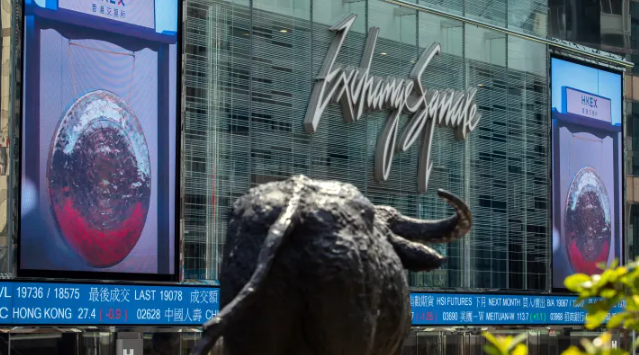Japan stocks led declines in Asia-Pacific markets on Wednesday, as investors parsed through earnings from the region, including reports from Japanese giants Toyota Motor and Mitsubishi.
Japan’s Nikkei 225 dropped 1.63% to end at 38,202.37, while the broad-based Topix closed 1.45% lower at 2,706.43. Both indexes hit their lowest levels in almost two weeks.
Singapore’s United Overseas Bank fell 2.9% even as the lender’s net profit of 1.47 billion Singapore dollars ($1.08 billion) in the first quarter beat LSEG estimate of SG$1.43 billion. The Straits Times Index dropped 1.29%.
Investors await China’s April trade data and Japan’s March pay numbers, both due Thursday.
Hong Kong’s Hang Seng index fell 0.77%, while mainland China’s CSI 300 index lost about 0.8% to close at 3,630.22.
HD Hyundai Marine Solution’s shares nearly doubled in their trading debut, following the South Korean ship maintenance and repair firm’s IPO, the country’s largest since January 2022.
The Kospi climbed 0.39% higher to its highest level in more than a month at 2,745.05, while the small-cap Kosdaq reversed losses to rise 0.13% and also hit a month-high level of 872.42.
Australia’s S&P/ASX 200 inched up 0.14% to finish at 7,804.5, marking a five-day winning streak.
Shell said it will sell its refinery and chemicals assets in Singapore to CAPGC, a joint venture between Indonesia’s Chandra Asri Capital and Swiss miner and commodities trader Glencore Asian Holdings.
While it did not disclose the value of the deal, the company said the transaction with CAPGC is expected to be completed by the end of 2024.
Shell’s assets, located on Jurong Island and Pulau Bukom in Singapore, include a 237,000 barrels-per-day refinery and a 1.1 million tonnes-a-year ethylene cracker. The refinery was Singapore’s first refinery in 1961.
The company added that staff in will continue their employment with CAPGC under the new ownership, and this will provide continuity for staff and contribute to ongoing operational reliability and safety.
Toyota Motor on Wednesday forecast lower operating profit for its current financial year.
The Japanese automaker said it expects operating income of 4.3 trillion yen ($27.7 billion) for fiscal year ending March 2025, which is about 20% lower than 5.35 trillion yen in the previous financial year.
Toyota said it will invest 380 billion yen, “to enhance the attractiveness of the automotive industry, provide support for supplier/dealer labor costs and invest in improving the environment for employees.”
Shares dipped 0.7% initially, but changed course to rise 0.9%. The broader Nikkei 225 index fell 1.46%.
Singapore’s United Overseas Bank
posted a first-quarter net profit of 1.47 billion Singapore dollars ($1.08 billion), a 2% fall compared to the same period last year. This however, beat the mean estimate of SG$1.43 billion from analysts polled by LSEG.
Net interest income, a key profitability indicator, eased to 2%, mainly due to lower net interest margins compared with a year ago.
However, UOB highlighted that net fee income grew 5% year over year to SG$580 million, driven by loan-related, wealth management and credit card fees.
The bank, which is Southeast Asia’s third largest, also said its integration with Citigroup’s businesses was “progressing well,” and said it will complete the integration in Vietnam in 2025.
Last year, UOB acquired Citi’s consumer businesses in four ASEAN markets.


